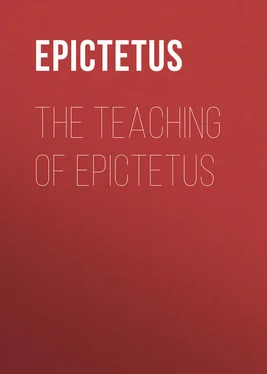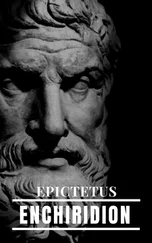Epictetus - The Teaching of Epictetus
Здесь есть возможность читать онлайн «Epictetus - The Teaching of Epictetus» — ознакомительный отрывок электронной книги совершенно бесплатно, а после прочтения отрывка купить полную версию. В некоторых случаях можно слушать аудио, скачать через торрент в формате fb2 и присутствует краткое содержание. Жанр: Философия, foreign_antique, foreign_prose, на английском языке. Описание произведения, (предисловие) а так же отзывы посетителей доступны на портале библиотеки ЛибКат.
- Название:The Teaching of Epictetus
- Автор:
- Жанр:
- Год:неизвестен
- ISBN:нет данных
- Рейтинг книги:5 / 5. Голосов: 1
-
Избранное:Добавить в избранное
- Отзывы:
-
Ваша оценка:
- 100
- 1
- 2
- 3
- 4
- 5
The Teaching of Epictetus: краткое содержание, описание и аннотация
Предлагаем к чтению аннотацию, описание, краткое содержание или предисловие (зависит от того, что написал сам автор книги «The Teaching of Epictetus»). Если вы не нашли необходимую информацию о книге — напишите в комментариях, мы постараемся отыскать её.
The Teaching of Epictetus — читать онлайн ознакомительный отрывок
Ниже представлен текст книги, разбитый по страницам. Система сохранения места последней прочитанной страницы, позволяет с удобством читать онлайн бесплатно книгу «The Teaching of Epictetus», без необходимости каждый раз заново искать на чём Вы остановились. Поставьте закладку, и сможете в любой момент перейти на страницу, на которой закончили чтение.
Интервал:
Закладка:
I may add here that the reader will find an Index at the end of this volume, in which every paragraph is referred to its original source in the Dissertations , Encheiridion , or Fragments – the references applying to Schweighäuser’s standard edition of Epictetus. 2 2 Epicteti Dissertationum ab Arriano Digestarum Libri IV. et ex Deperditis Sermonibus Fragmenta. Post Io. Uptoni aliorumque curas, denuo ad Codicum M Storum fidem recensuit, Latina Versione, Adnotationibus, Indicibus illustravit Johannes Schweighäuser, Lipsiæ. MDCCXCIX. Epicteti Manuale et Cebetis Tabula Græce et Latine. Schw. MDCCXCVIII. There are two excellent English translations of the whole extant works of Epictetus – one by Mrs. Carter, published in the last century, the other by the late George Long, M. A. (Bohn Series), to both of which, but especially the latter, I desire to record my great obligations.
As regards the style of my translation, I hope the tinge of archaism I have given it will be felt to suit the matter. I could think of no idiom so varied, so flexible even down to its use of various grammatical forms, so well suited alike to colloquy, or argument, or satire, or impassioned eloquence, as Elizabethan English.
So much to make the plan of the present work understood; and the reader may perhaps wish that I would now leave him to the study of it. But there is much in Epictetus the significance of which will not appear to any one who is unacquainted with the general system of Stoic philosophy which formed the basis of Epictetus’s ethical teaching. And I hope that the reader will prefer to have such information as is necessary given him in the form of a general introduction rather than in that of a multitude of notes.
The founder of the Stoic philosophy was Zeno, a native of Cyprus, who taught in Athens, about 300 b. c., in that frescoed arcade, or Stoa, which gave its name to his school. His birthplace is worth noting, for Zeno lived at the beginning of that epoch, himself one of the first products of it, in which the influence of the East became strongly apparent in Greek thought; the period called Hellenistic in contradistinction to the purely Hellenic period which ended in the conquests of the Macedonians. In many ways the conditions of life in the Hellenistic period formed the most favorable milieu possible for the development of Greek thought upon the only lines which, after Aristotle, it could fruitfully pursue; and this not in spite of, but even because of, the great degradation of political and social life from which all Hellendom then suffered. What the democratic polities were like, on which was laid the problem of confronting Philip of Macedon, we may conjecture from the history of the best known and assuredly not the worst of them, Athens. And the best type of Athenian whose rise to power was favored by the conditions of this time and place was Demosthenes: Demosthenes, the grand historical warning to all peoples against committing their destinies to professional orators; the statesman whose doubtless real veneration for his country and her past served only to make him a more mischievous counselor in her present difficulties; whose splendid power as a wielder of words was scarcely more signal than his incapacity and cowardice when he was called upon to match those words with deeds. Athens, entangling the Thebans in an alliance against Macedon, and then leaving them to face Alexander alone; deifying Demetrius the Besieger for driving out a Macedonian garrison, and allotting him the Parthenon itself to be his lodging and the scene of his unspeakable profligacies; murdering Phocion, the one man who dared to bring sincerity and virtue to her service – Athens was a type of the Greek States of this epoch: too unprincipled for democratic government, too contentious for despotism, too vain to submit to foreign rule, too lacking in valor, purpose, union, to resist it with effect.
Whatever the causes of the change may have been, the conditions of public life in this Hellenistic period were certainly very different from those which prevailed, albeit with decadence, before that vast breaking up of boundaries and destruction of political systems involved in the Macedonian conquests. The successful and inspiring conflict with Persia waged by the Hellenic States had for a time made all Greek hearts to beat with one aspiration, and had brought to the front a race of leaders who were capable of subduing the Greek democracies to their own steadfast and statesmanlike purposes. Public life was then not only a possible but even the most natural career for a man of talent and probity. The small size of the Greek States gave almost every such man an opportunity of action, and so keen and universal was the interest in politics that it threatened to lead Greek philosophy into a region in which philosophy is very apt to lose its vitalizing connection with human consciousness and experience, and to stiffen into barren speculation. In a word, man, as an individual, began to be too much lost sight of in the consideration of man as a citizen; his uses, his duties, the whole worth and significance of his life, came to be estimated too exclusively by his relations to the visible society about him. It was when the great Stoic Chrysippus found himself obliged to stand aloof from all participation in politics – “For if I counsel honorably I shall offend the citizens, and if basely, the Gods” – that such men as he were led to ask themselves: Is there then any sphere of human endeavor out of the reach of the tyranny of circumstance? If I cannot be a citizen, what am I worth then simply as a man? If I can be nothing to my fellows, what can I be to God? To a state of things, then, which, speaking broadly, made public life impossible to honest men, we owe the noblest ethical system of antiquity; to the enforced concentration of thought upon the individual we owe a certain note of universality till then absent from Hellenic thought.
But stoicism was not the only product of the speculation of this period. Side by side with it there started into being two other systems of philosophy, the necessity for combating which was doubtless of immense service to its development. These were Epicureanism and Pyrrhonism; and as the reader will find Epictetus much concerned with each of them, it may be desirable that I should give some brief account of their cardinal doctrines.
Epicurus was an Athenian. After some residence in Lesbos and Lampsacus, he began to teach in his native city about the year 306 B.C. His ethical views, which are all that concern us here, were of a distinctly unelevating nature. Pleasure, ἡδονή, was pronounced to be for each man the end and aim of his being, and the only rational motive of action. This, however, was not the pleasure of the voluptuary – its highest forms, according to Epicurus, were gained in ἀταραξία and ἀπονία – that is, a cheerful and unanxious temperament, with leisure for contemplation, ends not attainable by the criminal who lives in constant fear of detection, or the luxurious liver in whom satiety produces disgust and weariness.
Certain bodily conditions were, however, regarded as objects in themselves, and partaking of the nature of the absolutely good; and all entanglement in human relationships was discountenanced for the disturbance and distress which such relationships were liable to cause. These doctrines were put in practice by their teacher in inuring himself to a hermit-like simplicity and abstemiousness of life; and his life was philosophically consistent with his doctrines, for it is clear that the end of Pleasure will be most surely gained by him who has fewest wants to gratify. But though the lives of Epicurus and his immediate followers were exceptionally sober and strict, the total effect of his doctrine could not but have been evil. They were purely egoistic in this tendency – they centered each man’s activity and interest upon himself alone, they bade him take no thought for any other earthly or heavenly thing, and taught him that this ideal of indifference was realized in its full perfection by the Gods, who dwelt apart in divine repose while blind necessity had its way with human destiny.
Читать дальшеИнтервал:
Закладка:
Похожие книги на «The Teaching of Epictetus»
Представляем Вашему вниманию похожие книги на «The Teaching of Epictetus» списком для выбора. Мы отобрали схожую по названию и смыслу литературу в надежде предоставить читателям больше вариантов отыскать новые, интересные, ещё непрочитанные произведения.
Обсуждение, отзывы о книге «The Teaching of Epictetus» и просто собственные мнения читателей. Оставьте ваши комментарии, напишите, что Вы думаете о произведении, его смысле или главных героях. Укажите что конкретно понравилось, а что нет, и почему Вы так считаете.












